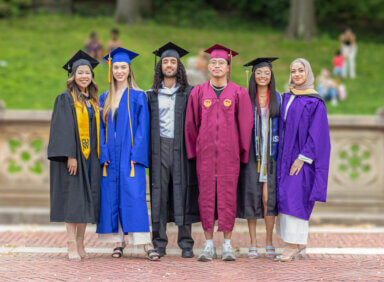A college degree is still key; 50K CUNY grads are about to prove it

For the 50,000 students earning CUNY degrees this year, commencement ceremonies at our 25 colleges and schools are recognition of academic achievement and the perseverance that brought them to the finish line.
Nearly half are the first generation in their family to earn a college degree. Many are immigrants. Thousands pursued their diplomas while juggling jobs and raising children or returned to school decades after finishing high school.
Whatever their circumstances, they have one thing in common: They understand the value of obtaining a quality affordable college degree. They are ready to follow their paths to careers and the economic and social mobility that so many CUNY graduates before them have enjoyed.
The unique value of a CUNY education is always front of mind at this time of year. But it’s even more relevant this year because we are in a time when declines in post secondary enrollment, especially at community colleges, are fueling a growing national conversation about the value of college.
A recent study funded by the Bill & Melinda Gates Foundation found that many students are skeptical that the high costs and challenges of college are worth the payoff. They wonder if college is necessary to their future success. My answer is unequivocally yes.
Why College is Necessary
Affordable higher education — at whatever level — is still the surest route to social and economic mobility. It is certainly the case for those from underrepresented groups, who make up a majority of CUNY’s student population. The key word, of course, is “affordable,” and that is where CUNY delivers: 75% of all our students graduate without debt.
I’m not the only one lauding the value of a CUNY degree. Last year, the public policy organization Third Way found that 10 CUNY senior colleges were among the 50 best in the nation for providing a pathway to economic mobility. And college rankings, including a new tool developed by the New York Times that considers a mix of qualities such as affordability, academics, diversity and return on investment, are touting the success of CUNY.
We’ve achieved this status in good part by focusing on improving post-graduation outcomes, intensifying our efforts to connect classrooms to careers. We’ve forged numerous public and private partnerships that provide our students with an array of opportunities for paid internships, apprenticeships and, ultimately, jobs after graduation. As a result, greater numbers of employers — small and large — are recognizing the value of a CUNY education, knocking on our doors to find ways to connect our students and graduates with their businesses.
As we sustain this push in the coming years, we expect to vastly increase the percentage of students who complete paid internships and are consistently employed within one year of graduation, as well as the number of employers who visit our campuses to actively recruit our students. The ambitious CUNY Inclusive Economy initiative invests millions of dollars in public and private funds to help our graduates succeed. In just the last month, we have celebrated the success of CUNY’s career-focused collaborations with the MTA, Mount Sinai Hospital and Queens-based Boyce Technologies, a small business that designs and produces cutting-edge security systems and currently employs 20 CUNY graduates and seven student-interns.
We’ve also learned that meeting students where they are in their lives and career paths is key to enabling more New Yorkers to access a CUNY education and the opportunity it offers. So many students — and potential students — need flexibility because of family responsibilities, jobs or distance. So we’re continuing to build CUNY Online, our program of certificate and degree programs offered fully online.
We’re also finding new ways to draw students. This academic year, for example, with the support of NYC’s City Council, we started CUNY Reconnect, a program to help working-age New Yorkers re-enroll in college. We’ve already brought back some 17,000 students, far surpassing the initial goal, and we’re streamlining admissions, financial aid and credit transfer programs, among others, to make it easier for more students to enroll or re-enroll.
Nothing makes me prouder than hearing one of our graduates say a CUNY college served as the gateway to their success. As they make their way across the commencement stages this spring, the Class of 2023 is carrying a great legacy forward, ready to prove that a CUNY diploma is more valuable than ever.
Matos Rodríguez is the chancellor of The City University of New York (CUNY), the largest urban public university system in the United States.




